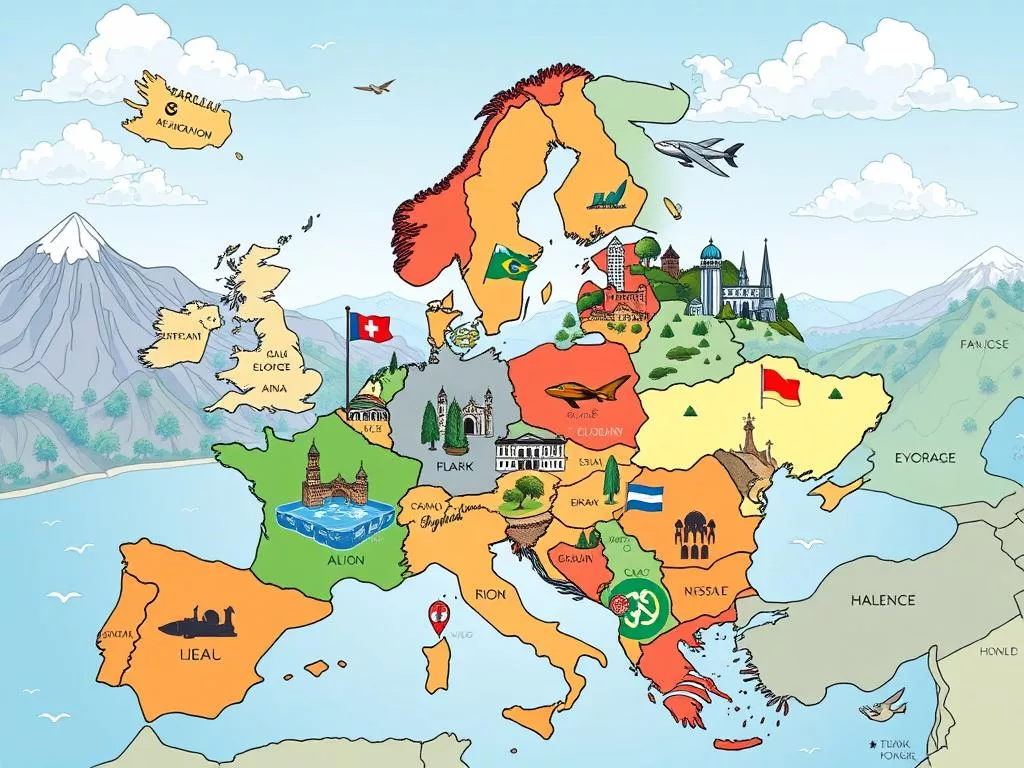Opening a European bank account as a non-resident might seem hard. But it’s key for those traveling or doing business in Europe. With over 4,880 banks in the European Union, you have many choices. As of October 2024, many Americans are choosing European banks for their ease and benefits.
Non-residents need to understand the banking rules in Europe. Things like fees, access, and laws differ a lot. U.S. citizens also face rules about foreign bank accounts. By knowing these and using the right resources, you can get a European bank account that fits your needs. For more info, check out this guide.
Understanding Non-Resident Banking in Europe
Non-resident banking in Europe follows specific EU banking regulations. These rules help foreign nationals access financial services. Many EU countries allow non-residents to open basic payment accounts.
These regulations ensure that those with a foreign passport can apply for banking services. But, the application process can vary by country.

Every country has its own bank requirements. It’s important for applicants to know what documents are needed. Typically, you’ll need a valid passport, proof of address, and personal details.
In Belgium, for example, banks require a written explanation if they deny an account. This gives applicants a chance to appeal to authorities like Ombudsfin or Unia.
Different account types are also key in non-resident banking. Many banks offer basic accounts with essential services but no overdrafts. This helps newcomers to banking.
In countries like Estonia, getting a euro-denominated account is easier. This makes international transactions simpler.
Banking challenges in the EU show the need to understand local rules. A study by Myria found immigrants in Belgium face hurdles opening bank accounts without a local IBAN. Banks like Wise, Revolut, and HSBC Expat have created solutions for non-residents.
These solutions show the banking sector is adapting to meet diverse needs. Knowing your rights and options is key when dealing with EU banking regulations. As regulations evolve, so do opportunities for better financial inclusion.
Best European Countries for Opening Bank Accounts as a Non-Resident
For non-residents looking to open bank accounts in the Eurozone, some countries are better than others. Portugal is a top choice because of its easy banking process. Banks like ActivoBank and Banco CTT don’t charge monthly fees and serve non-EU residents in English. The Multibanco system also makes it easy to do various tasks at ATMs.
Estonia is another great option, thanks to its e-residency program. This program helps non-residents start businesses and access European bank accounts from anywhere. Estonia’s streamlined procedures make it a favorite among international entrepreneurs.
Germany is known for its solid banking rules and many banks that welcome non-residents. While setting up an account might need more paperwork, the benefits are worth it. It’s great for those who want to invest or do business in the EU.
Online banks like N26 offer easy access to banking with low fees. They make it simple for non-residents to manage their money. You can open an account quickly without having to visit a bank, which is perfect for busy people or expats.
In summary, non-residents have many options for European bank accounts. From Portugal’s friendly policies to Estonia’s e-residency program and Germany’s solid banking, there’s a lot to consider. Knowing these differences helps non-EU residents choose the best banking solutions for them. For more information, check out European bank accounts for non-residents.

| Country | Key Features | Popular Banks | Requirements |
|---|---|---|---|
| Portugal | No monthly fees, Multibanco access, Mobile payments via MBway | ActivoBank, Banco CTT | NIF, proof of income, proof of address |
| Estonia | E-residency program, excellent for EU businesses | Various digital banks | Identity verification, business documents |
| Germany | Strong banking regulations, extensive bank options | Deutsche Bank, Commerzbank | Proof of income, ID |
| Digital Banks | Low fees, remote account openings | N26, Revolut | Online verification, ID |
Guide to Open European Bank Account for Non Residents
Opening a bank account in Europe as a non-resident has several key steps. First, you need to pick the right bank. Banks in France like Crédit Mutuel and BNP Paribas, and online banks like Monabanq and N26, serve foreign nationals. Each has its own rules.
Documentation required changes based on the bank and your situation. You’ll usually need ID, proof of address, and sometimes a letter from your current bank. Being ready can make the process smoother and increase your chances of getting approved.
- Selecting a bank suitable for non-residents.
- Completing personal information forms either online or in person.
- Providing supporting documents as mentioned earlier.
- Making an initial deposit. Amounts may vary from €0 to €300 depending on the institution.
Banks can turn down your application without telling you why. If this happens, you can ask the Banque de France to review it.
Knowing the local rules and the international banking services can help a lot. It makes moving to foreign banking easier for non-residents.
| Banking Type | Examples | Account Opening Requirements | Initial Deposit |
|---|---|---|---|
| Traditional Banks | Crédit Mutuel, LCL | Identification, proof of residence | €0 – €300 |
| Online Banks | Monabanq, Fortuneo | Identification, online forms | €0 – €200 |
| Neobanks | N26, Revolut | Identification, digital verification | €0 |
Types of Banks Accepting Non-Residents
Non-residents in Europe have many banking options. Traditional banks like HSBC, Barclays, and NatWest have special departments for them. These banks offer many services but have strict rules, like needing a lot of money and certain documents.
Online banks are a newer choice. They make opening an account easier for non-residents. But, banks like Monabanq might have tough rules. Some people like online banks for their speed, but others prefer traditional banks for their trustworthiness.
Neobanks are becoming popular too. They offer easy-to-use services and low fees. Banks like Revolut and N26 are great for those who like digital banking. They have good rates for international money transfers and let you handle different currencies easily. But, it’s important to check if you qualify for these banks. The banking world is always changing.

